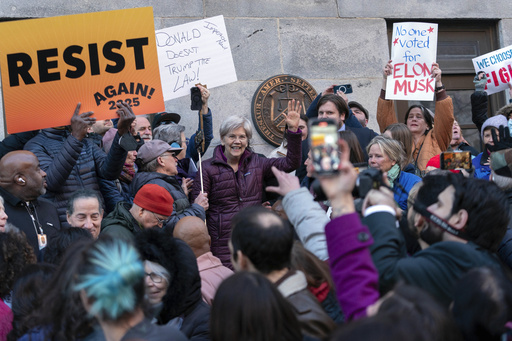
WASHINGTON — In the Pacific Northwest, a federal employee is contemplating resignation amid a wave of uncertainty impacting the nation’s vast government workforce. This worker, who wishes to remain anonymous due to fears of job repercussions, is considering taking advantage of an unusual financial incentive crafted by Elon Musk—an influential advisor to the Trump administration. Musk’s initiative offers several months in pay for individuals willing to resign from their government positions, enticing many to contemplate leaving for opportunities overseas. However, concerns linger about the legitimacy of the offer and whether it may serve as a covert strategy to identify disloyal employees.
This worker’s dilemma reflects a larger sentiment permeating the federal sector, which employs over 2 million individuals in various roles, from scientists to accountants. These employees have until 11:59 p.m. ET Thursday to make critical decisions regarding their futures. The Trump administration is actively promoting this resignation program as part of a broader agenda aimed at redefining the federal workforce, with a key focus on dismantling what they term the “deep state,” which they allege undermines government operations. Administration representatives assert that this initiative presents a unique opportunity for employees to exit while still receiving financial compensation until September 30.
In recent days, pressure on federal staff has intensified, with warnings that layoffs and furloughs could ensue for those who stay. An email from the Office of Personnel Management outlined that significant downsizing efforts would likely affect most federal agencies, urging employees who remain to demonstrate “loyalty” and comply with heightened standards of behavior moving forward. The administration indicated that individuals participating in unlawful activities would face swift investigation and potential disciplinary action.
Concerns arise from both political and union perspectives, with Democrats cautioning that the offer could lack Congressional endorsement, posing a risk of unpaid dues following resignation. Unions have initiated legal action to contest Trump’s proposals, and a hearing to evaluate the buyout initiative is set for Thursday afternoon in Boston. Everett Kelley, president of the American Federation of Government Employees, openly criticized the program as a fraudulent scheme aiming to lure individuals out of their positions, advising workers not to participate in it.
The atmosphere within various agencies underscores significant skepticism regarding the program’s validity. An anonymous employee from the Department of Education expressed doubts about the administration’s motives and highlighted notice a clause within the offer that would waive the right to sue if the government fails to fulfill its promises.
Musk, who leads the newly established Department of Government Efficiency, is spearheading efforts to trim the federal bureaucracies, with officials ensuring employees that the resignation offer is genuine and intended to be a substantial reform effort in the civil service. Amidst the approaching deadline, agency leaders have been conducting briefings to address employee inquiries, clarifying the administration’s strategy and bolstering morale amidst unease. Rachel Oglesby, chief of staff at the U.S. Department of Education, expressed that the opportunity is indeed formatted to align with Trump’s campaign promises for federal reform.
Many within the workforce remain unconvinced about the integrity of the buyout options. Personal skepticism regarding the authority of Trump to authorize such payments persists, especially given his previous business history of neglecting contractors. Public demonstrations have surfaced near federal buildings, with advocates urging workers to voice their concerns and resist potential loyalty tests imposed by the administration. Dante O’Hara, a government employee, articulated his fears, stating that the current climate has left many uncertain about their job security and future.
Voices critical of the downsizing initiatives highlight the value of federal positions. Dan Smith, a Maryland resident with familial ties to the Department of Agriculture, denounced the lack of appreciation shown toward federal workers and criticized the administration’s approach as overtly aggressive. On her part, Mary-Jean Burke, a physical therapist at the Department of Veterans Affairs in Indianapolis, voiced apprehensions regarding potential staffing shortages in healthcare. Burke indicated that many initially eager to exit their roles are now hesitating due to emerging doubts about the program’s promises, further fueled by a misguided social media campaign that emphasized the allure of essentially taking advantage of a paid vacation.
Despite the uncertainties and conflicts surrounding the initiative, Trump appears to have succeeded in creating a shake-up within the federal workforce, leaving many employees grappling with the ongoing disruption.

